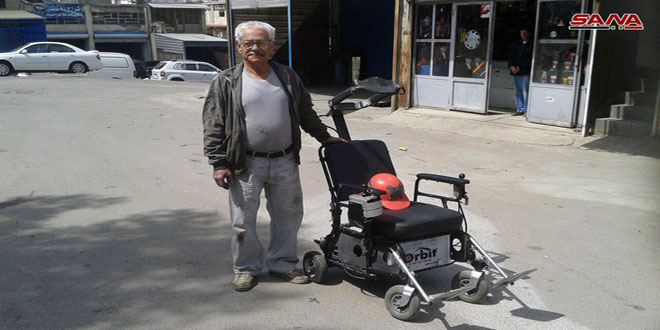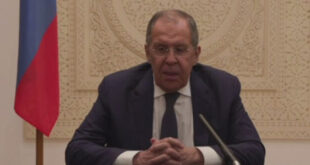Sweida, SANA – Syrian inventor Ajwad Hassan Shujaa has designed a prototype of a wheelchair controlled by head motion to enable quadriplegics and amputees to move around independently using the movement of their head, which directs the movement of the wheelchair without the need for any assistance from another person.
The most common way to control the electric wheelchairs is to use a joystick. However, there are individuals who are unable to operate joystick-driven wheelchairs due to severe physical disabilities, like quadriplegia.
Electric wheelchairs are designed to aid paraplegics, but unfortunately, these cannot be used by persons with higher degree of impairment, such as quadriplegics, i.e. persons that, due to age, illness, or injury, cannot move any of their body parts, except of the head. Medical devices designed to help them are very complicated, rare, and expensive.
The wheelchair designed by Shujaa seems to be very simple at first glance, but upon closer inspection, one can see that it includes electrical engines, charging circuit, and an electrical circuit, in addition to two batteries.
The wheelchair moves according to commands it receives from a plastic hat placed on the patient’s head, which sends wireless signals to a circular frame attached to the chair which in turn gives orders through wires connected to the wheelchair’s electronic system to make it move in the required direction in accordance with the head’s motion.
Shujaa took about a year to turn his design into reality, and he made the wheelchair from iron and plastic components he put together himself using simple tools such as a drill, grinder, and welding machine.
The relatively low cost of making the wheelchair makes it affordable for most of the people with quadriplegia, in addition to the possibility of using it by those who are suffering from paraplegia as it is equipped with a conventional joystick as well.
The invention is the result of a long experience which Shujaa has gained from his work as a motorcycle and car mechanic at the industrial zone in Sweida City.
Shujaa’s invention proves to the whole world that despite of all difficult circumstances which Syria went through due to the terrorist war waged against it, the Syrians are still able to come up with inventions that could serve a significant segment of the society.
Shujaa won a bronze medal for his invention at Al-Bassel Fair for Innovation and Invention during the latest edition of Damascus International Fair, and this was an incentive for him to work more on his invention, and he filed the necessary paperwork to patent his design.
“I work tirelessly on accomplishing my inventions to serve society,” Shujaa said, adding that he and his colleagues face some difficulties, such as the lack of sponsorship or endorsement.
He called for increasing the support provided to inventors and providing valuable rewards to encourage them to work more on their inventions.
Saeed Mleih, the head of the Syrian Inventors Society branch in Sweida, said this invention is very beneficial to quadriplegics and people with other disabilities, and it should be mass-produced.
Mleih noted that Shujaa has shown considerable skill and innovation in adapting the materials he used to fit the design’s needs, as most of the needed components are not available at the local market.
Inventor Ajwad Hassan Shujaa was born in Sweida in 1946. He is a retired assistant engineer and a member of the Syrian Inventors Society.
Shujaa has participated in many innovation fairs, and one of his most important inventions is an automatic chair that helps people with lower limb disability to climb stairs and sidewalks, in addition to inventing a burglar alarm and an invention for protecting telephone landlines from being used without authorization.
Ruaa al-Jazaeri/ Hazem Sabbagh
 Syrian Arab News Agency S A N A
Syrian Arab News Agency S A N A

